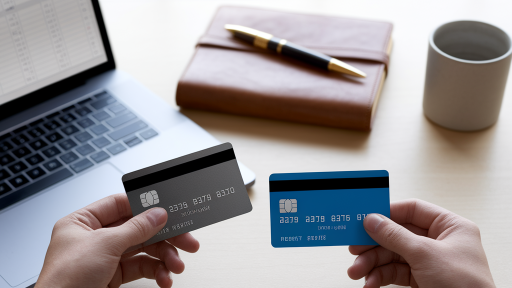Navigating the world of business financing can feel like an uphill battle, especially when a poor credit history casts a long shadow. For many entrepreneurs, the need for flexible capital is critical for growth, covering unexpected expenses, or simply managing daily cash flow. The question then becomes a pressing one: is the door to business credit completely closed?
The good news is a resounding no. While having bad personal credit certainly adds a layer of complexity, it doesn’t automatically disqualify you from obtaining a business credit card. There are specific pathways and financial products designed for business owners in your exact situation. This guide will walk you through those options and provide a clear roadmap to securing the funding you need.
Understanding Why Your Credit Score Matters
Before diving into the solutions, it’s essential to understand what lenders are looking at. When you apply for a business credit card, especially for a new or small business, issuers don’t have a long history of your company’s financial behavior to assess. Consequently, they lean heavily on your personal credit history as a proxy for your financial responsibility.
Personal vs. Business Credit: What’s the Difference?
Most people are familiar with their personal credit score, like the FICO score, which ranges from 300 to 850. It’s a reflection of your personal borrowing and repayment history. A business credit score, on the other hand, is tied directly to your business’s financial obligations and is tracked using your Employer Identification Number (EIN). Scores like Dun & Bradstreet’s PAYDEX score operate on a different scale (1-100) and measure how promptly your business pays its vendors and creditors.
For a startup or a sole proprietorship, your personal credit is the primary factor. Lenders use it to predict how you’ll manage your business’s finances. As your business grows and establishes its own credit history, lenders will gradually place more weight on its business credit score, but a personal guarantee is almost always required in the beginning.
What Qualifies as “Bad Credit” for a Business Card?
While the exact threshold varies between card issuers, a personal FICO score below 670 is generally considered “fair” or “subprime.” Scores below 580 are typically classified as “poor” or “bad credit.” If your score falls into this range, you’ll likely be declined for traditional, unsecured business credit cards that offer premium rewards and low interest rates. However, this is precisely where specialized cards and alternative strategies come into play.
Your Best Options for a Business Credit Card with Bad Credit
Don’t be discouraged by a low score. The financial market has evolved to cater to entrepreneurs from all backgrounds. Here are the most viable options for securing a business credit card when you have a challenging credit history.
1. Secured Business Credit Cards
This is often the best and most accessible starting point for business owners with poor credit. A secured card works by requiring a refundable security deposit. This deposit typically becomes your credit limit, effectively eliminating the lender’s risk. If you deposit $1,000, your credit limit will be $1,000.
- Pros: Very high approval odds, as the card is secured by your own cash. Most importantly, responsible use is reported to the credit bureaus, making it an excellent tool for actively rebuilding both your personal and business credit.
- Cons: Requires upfront capital for the security deposit, which can be a challenge for cash-strapped businesses. Credit limits are often lower, and the cards tend to have fewer perks or rewards compared to unsecured cards.
2. Business Credit Cards That Don’t Require a Personal Credit Check
These are less common but do exist. Instead of your FICO score, these card issuers focus entirely on your business’s financial health. They will analyze factors like your monthly revenue, average daily bank balance, and time in business. These are often called “charge cards,” requiring you to pay the balance in full each month.
- Pros: Your personal credit score is not a factor in the approval decision.
- Cons: They have strict requirements, often demanding high monthly revenues (e.g., $10,000+ per month) and a healthy business checking account. This makes them inaccessible for most startups or very small businesses.
3. Prepaid Business Debit Cards
While not technically a “credit” card, a prepaid business card is a fantastic tool for managing expenses without any credit check. You load funds onto the card and use it for purchases until the balance is depleted. You can’t spend more than you have, which helps with budgeting.
- Pros: Guaranteed approval since there is no credit involved. Helps separate business and personal expenses and allows you to issue cards to employees with set spending limits.
- Cons: It does absolutely nothing to build or repair your credit history, as no credit is being extended. It’s a spending tool, not a financing tool.
A Step-by-Step Guide to Applying
Securing a card with bad credit requires a more strategic approach than simply filling out the first application you see. Follow these steps to maximize your chances of success.
Step 1: Know Your Numbers Before You Apply
First, you need a clear picture of your financial standing. Pull your personal credit report and score. You are entitled to a free report from each of the three major bureaus annually. Review it for any errors that might be dragging your score down and dispute them if necessary. Next, gather your key business information: your EIN, legal business name, annual revenue, and number of years in business.
Step 2: Research and Compare Your Options
Not all cards for bad credit are created equal. Look specifically for cards marketed as “secured” or “for building credit.” Pay close attention to fees (annual fees, processing fees) and the process for getting your deposit back or “graduating” to an unsecured card. A comparison can help clarify your best path forward.
| Card Type | Approval Likelihood | Credit Building Potential | Key Requirement |
|---|---|---|---|
| Secured Credit Card | Very High | Excellent | Refundable Security Deposit |
| Revenue-Based Card | Medium (if revenue is high) | Good | Strong Monthly Revenue |
| Prepaid Debit Card | Guaranteed | None | Funds to load onto the card |
Step 3: Prepare Your Security Deposit (If Applicable)
If you’ve decided a secured card is your best bet, make sure you have the funds for the deposit ready. The minimum deposit is often around $200-$500, but providing a larger deposit can give you a more useful credit limit for your business operations.
Step 4: Apply Strategically
Resist the temptation to apply for multiple cards at once. Each application typically results in a “hard inquiry” on your credit report, which can temporarily lower your score. Start with the one card that you have the highest chance of being approved for, likely a secured card, and build from there.
Beyond Credit Cards: Alternative Financing for Bad Credit
A business credit card isn’t your only option for capital. If your needs are more immediate or substantial, it’s wise to explore these alternatives, which are often more accessible to those with poor credit.
- Business Lines of Credit: Some online lenders offer revolving lines of credit to businesses with lower credit scores, though they often look for strong revenue to compensate for the risk.
- Merchant Cash Advances (MCA): If your business processes a lot of credit card sales, you can get an MCA. This is an advance on your future sales, which you repay with a percentage of your daily transactions. Be cautious, as they come with very high effective interest rates.
- Invoice Factoring: This involves selling your outstanding invoices to a third-party company (a “factor”) at a discount. You get immediate cash, and the factor collects payment from your client. It’s a way to unlock cash tied up in unpaid invoices.
- Microloans: Non-profit organizations and government-backed programs, like those from the SBA Microloan Program, offer small loans (typically under $50,000) to startups and small businesses. They often have more flexible lending criteria than traditional banks.
How to Improve Your Credit to Qualify for Better Cards
Getting a card for bad credit is a great first step, but the long-term goal should be to improve your creditworthiness to unlock better financing options in the future. Focus on improving both your personal and business credit profiles simultaneously.
Strategies for Boosting Your Personal Credit Score
Your personal score is your foundation. Work diligently to improve it with these proven methods:
- Pay Every Bill On Time: Payment history is the single largest factor in your credit score. Set up automatic payments to ensure you never miss a due date.
- Lower Your Credit Utilization: This is the ratio of your credit card balances to your credit limits. Aim to keep your utilization below 30% on all personal cards.
- Dispute Errors on Your Report: Go through your credit reports from a source like AnnualCreditReport.com with a fine-tooth comb. Incorrect information can be removed, potentially giving your score a quick boost.
- Become an Authorized User: If you have a trusted family member with excellent credit, ask them to add you as an authorized user on one of their long-standing credit cards. Their positive history can positively impact your score.
Building a Strong Business Credit Profile
While improving your personal score, start laying the groundwork for a solid business credit history.
- Establish Your Business Formally: Separate your business and personal identities by incorporating or forming an LLC, and get an Employer Identification Number (EIN) from the IRS.
- Open a Business Bank Account: All business income and expenses should flow through this account. This creates a financial record that is separate from your personal finances.
- Work with Vendors Who Report Payments: Open small lines of credit (known as “net-30 accounts”) with suppliers who report your payment history to business credit bureaus like Experian Business or Dun & Bradstreet. Paying these invoices on time is a powerful way to build a positive business credit file from scratch.
Frequently Asked Questions (FAQ)
Can I get a business credit card with an EIN only and no personal guarantee?
For a new business or a business owner with bad credit, this is extremely unlikely. Virtually all issuers require a personal guarantee from the owner. This means if the business defaults on the debt, you are personally responsible for repaying it. Only very large, established corporations with rock-solid financials can typically get corporate cards without a personal guarantee.
Will a business credit card application affect my personal credit score?
Yes, in most cases. When you apply, the card issuer will perform a hard pull on your personal credit report, which can cause a small, temporary dip in your score. However, the good news is that for most business credit cards, the ongoing account activity (your balance, payments, etc.) is not reported to your personal credit bureaus unless you default on the account.
Are there any “guaranteed approval” business credit cards?
You should be highly skeptical of any product that claims “guaranteed approval.” While secured cards and prepaid debit cards have the highest approval rates because the risk to the lender is minimal or nonexistent, no legitimate credit product can be 100% guaranteed. The term is often a red flag used by predatory lenders or in marketing for prepaid cards, which don’t actually offer credit.
Your Path Forward: A Final Word of Advice
Having bad credit is a hurdle, not a wall. It requires you to be more patient, strategic, and disciplined, but it does not lock you out of the world of business finance. Start by securing a tool that helps you rebuild, like a secured credit card. Use it responsibly for small business purchases and pay the balance in full every single month without fail.
This single action begins a positive cycle, improving your credit history and demonstrating your reliability to future lenders. As your scores improve, you will graduate to better cards with higher limits and more valuable rewards. According to official resources, one of the best ways to get a business credit card with bad credit is to start by building a strong, positive payment history, even if it’s with a secured product.




